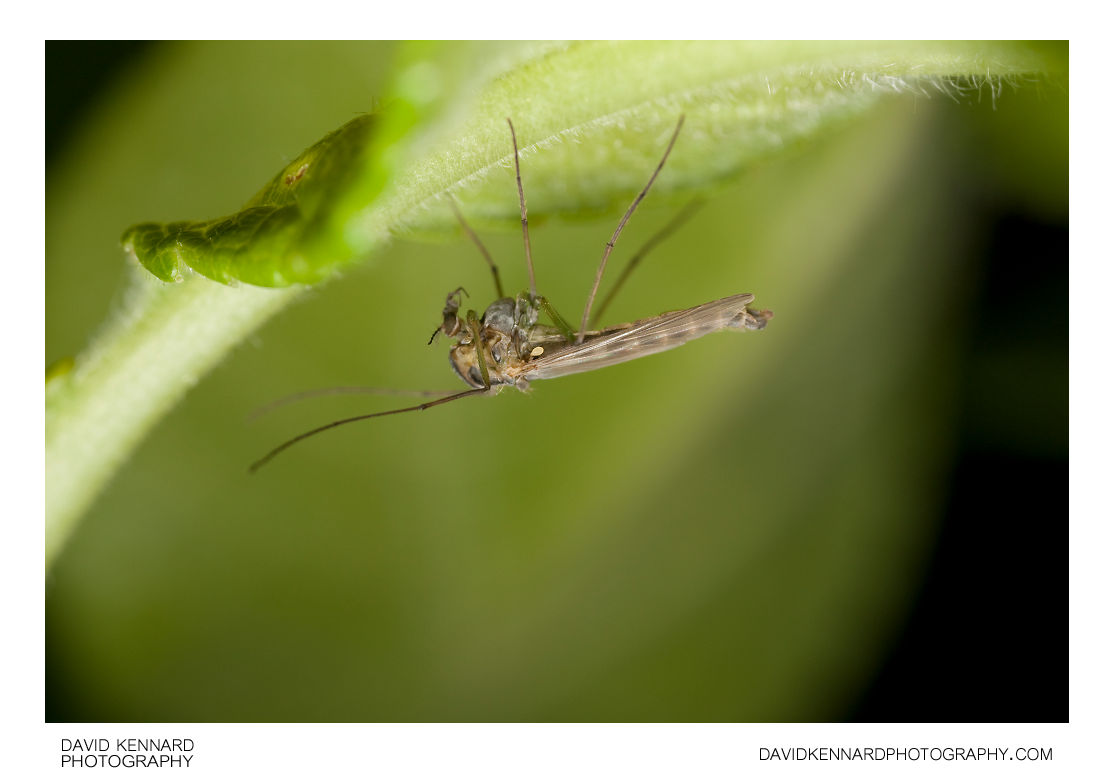Chironomid fly

Description
- Title:
- Chironomid fly
- Caption / Description:
-
A Chironomid fly sits on the underside of a leaf.
Description from Wikipedia (http://en.wikipedia.org/wiki/Chironomidae):
Chironomidae (informally known as chironomids or non-biting midges) are a family of nematoceran flies with a global distribution. They are closely related to the Ceratopogonidae, Simuliidae, and Thaumaleidae. Many species superficially resemble mosquitoes but they lack the wing scales and elongate mouthparts of the Culicidae. This is a large group of insects with over 5000 described species and 700 species in North America alone. Males are easily recognized by their plumose antennae. Adults are sometimes known as "lake flies" in parts of Canada, as "sand flies", "muckleheads", or "muffleheads" in various regions of the USA Great Lakes area, and as "blind mosquitoes" or "chizzywinks" in Florida, USA.
Larvae can be found in almost any aquatic or semiaquatic habitat, including treeholes, bromeliads, rotting vegetation, soil, and in sewage and artificial containers. Larvae of some species are bright red in color due to a hemoglobin analog; these are often known as "bloodworms".
Adults can be pests when they emerge in large numbers. They can damage paint, brick, and other surfaces with their droppings. When large numbers of adults die they can build up into malodorous piles. They can provoke allergic reactions in sensitive individuals.
Larvae and pupae are important as food items for fish such as trout and other aquatic organisms. The flying midges themselves are also eaten by fish, and insectivorous birds such as swallows and martins. The larvae are consumed by certain amphibians, such as the rough-skinned newt. They are also used by fly anglers, who design and tie imitators to catch trout.
They are also important as indicator organisms, i.e., the presence, absence, or quantities of various species in a given body of water can indicate whether pollutants may be present. Their fossils are also widely used by palaeolimnologists as indicators of past environmental changes, including past climatic changes.
- Tags / Keywords:
-
- Biota
- Life
- Vitae
- Eukaryota
- Animalia
- Animals
- Arthropoda
- Arthropods
- Insecta
- Insects
- Diptera
- Flies
- Chironomidae
- Non-biting midges
Admin
- Date Original Photo Taken:
- Original File Name:
- Event:
- Rating:
- ☆
- Date this image added/last updated on website:
- Original File Dimensions:
- 4272px x 2848px
- File Type:
- JPEG
- Color Mode:
- RGB
- Original Image Color Profile:
- Adobe RGB (1998)
Location
- Location Created:
-
- Sublocation:
- City:
- Market Harborough
- Province/State:
- Leicestershire
- Country:
- United Kingdom
- World Region:
- Europe
- Geo-location:
Rights
- Copyright Status:
- Copyrighted
- Licensing Status:
- Rights Managed
- Available for Editorial Use:
- Yes
- Available for Commercial Use:
- Yes
- Copyright Notice:
- © 2010 Dave Kennard
Camera Data
- Date Digital Resource was created:
- Shutter speed:
- 1⁄200 s
- Aperture:
- f/8
- Camera Model:
- Canon EOS 450D
- ISO:
- 100
- Exposure Compensation:
- 0
- Focal Length:
- 65mm
- Focal Length (35mm equiv.):
- Metering Mode:
- Multi-segment
- Flash:
- On, Fired
- Exposure Mode:
- Manual
- White Balance:
- Manual
- Light Source:
- Exposure Program:
- Manual
Additional shooting metadata
- Lens:
- Canon MP-E 65mm F2.8 1-5x Macro
- Filters used:
- Additional Optics used:
- Setup:
- Handheld
Canon MT-24EX Macro Twin Flash with home-made diffusers
Post Processing
- Image Modified:
- Software used:
- Post Processing:
